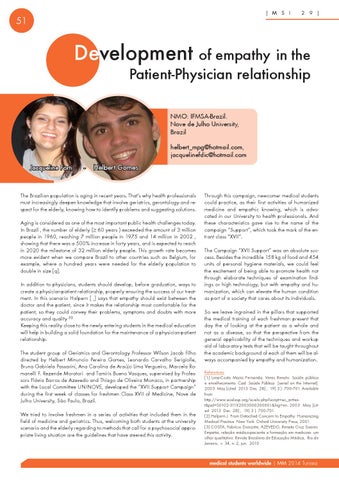( M S I
51
2 9 )
Development of empathy in the Patient-Physician relationship NMO: IFMSA-Brazil. Nove de Julho University, Brazil helbert_mpg@hotmail.com, jacquelinefdic@hotmail.com Jacqueline Forti
-
Helbert Gomes
The Brazilian population is aging in recent years. That’s why health professionals must increasingly deepen knowledge that involve geriatrics, gerontology and respect for the elderly, knowing how to identify problems and suggesting solutions. Aging is considered as one of the most important public health challenges today. In Brazil , the number of elderly (≥ 60 years ) exceeded the amount of 3 million people in 1960, reaching 7 million people in 1975 and 14 million in 2002 , showing that there was a 500% increase in forty years, and is expected to reach in 2020 the milestone of 32 million elderly people. This growth rate becomes more evident when we compare Brazil to other countries such as Belgium, for example, where a hundred years were needed for the elderly population to double in size [¹]. In addition to physicians, students should develop, before graduation, ways to create a physician-patient relationship, properly ensuring the success of our treatment. In this scenario Halpern [²] says that empathy should exist between the doctor and the patient, since it makes the relationship most comfortable for the patient, so they could convey their problems, symptoms and doubts with more accuracy and quality [1] Keeping this reality close to the newly entering students in the medical education will help in building a solid foundation for the maintenance of a physician-patient relationship. The student group of Geriatrics and Gerontology Professor Wilson Jacob Filho directed by Helbert Minuncio Pereira Gomes, Leonardo Carvalho Serigiolle, Bruna Gabriela Passarini, Ana Carolina de Araújo Lima Vergueiro, Marcela Romanelli F. Rezende Moratori and Tamiris Bueno Vasques, supervised by Professors Flávia Barros de Azevedo and Thiago de Oliveira Monaco, in partnership with the Local Committee UNINOVE, developed the “XVII Support Campaign” during the first week of classes for freshmen Class XVII of Medicine, Nove de Julho University, São Paulo, Brazil. We tried to involve freshmen in a series of activities that included them in the field of medicine and geriatrics. Thus, welcoming both students at the university scenario and the elderly regarding to methods that call for a psychosocial appropriate living situation are the guidelines that have steered this activity.
Through this campaign, newcomer medical students could practice, as their first activities of humanized medicine and empathic knowing, which is advocated in our University to health professionals. And these characteristics gave rise to the name of the campaign “Support”, which took the mark of the entrant class “XVII”. The Campaign “XVII Support” was an absolute success. Besides the incredible 158 kg of food and 454 units of personal hygiene materials, we could feel the excitement of being able to promote health not through elaborate techniques of examination findings or high technology, but with empathy and humanization, which can elevate the human condition as part of a society that cares about its individuals. So we leave ingrained in the pillars that supported the medical training of each freshman present that day the of looking at the patient as a whole and not as a disease, so that the perspective from the general applicability of the techniques and workup aid of laboratory tests that will be taught throughout the academic background of each of them will be always accompanied by empathy and humanization. References: [1] Lima-Costa Maria Fernanda, Veras Renato. Saúde pública e envelhecimento. Cad. Saúde Pública [serial on the Internet]. 2003 May [cited 2013 Dec 28] ; 19( 3 ): 700-701. Available from: http://www.scielosp.org/scielo.php?script=sci_arttext&pid=S0102-311X2003000300001&lng=en. 2003 May [cited 2013 Dec 28] ; 19( 3 ): 700-701. [2] Halpern J. From Detached Concern to Empathy: Humanizing Medical Practice. New York: Oxford University Press; 2001. [3] COSTA, Fabrício Donizete; AZEVEDO, Renata Cruz Soares. Empatia, relação médico-paciente e formação em medicina: um olhar qualitativo. Revista Brasileira de Educação Médica, Rio de Janeiro, v. 34, n. 2, jun. 2010.
medical students worldwide | MM 2014 Tunisia
